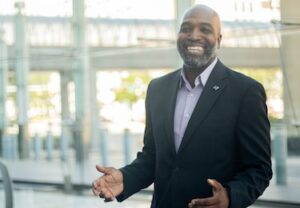Racial Disparity in End of Life Care
by Pastor Corey Kennard

On July 29 INELDA interviewed Pastor Corey Kennard in a live webinar titled: Getting Real about Racial Disparity in End of Life Care. During the webinar, people asked a number of questions that Pastor Kennard didn’t have time to answer. He was kind enough to supply written answers to those questions for people who attended the webinar. We have selected some of those questions to publish here with Pastor Kennard’s responses.
Question: Are there views around death and dying that are broadly true for most African Americans?
Answer: In my presentation on grief in the Black community I present the following as somewhat universal views on death and dying in the Black community:
- “The dead are not really dead” – they enter another realm of existence
- Death is not to be avoided but accepted as destiny
- There is a spiritual connection between human and natural worlds
- The process of dying unites us with the broader community of our ancestors
- The community shares spiritual, emotional, financial, and practical responsibility for the bereaved
These beliefs can be discovered by questioning and interacting with Black people to learn more about these views. Some may be more regional, and others may be more cultural. Just know that there are no absolutes.
Question: What do you see as the difference between culturally specific care, that is care provided by a person of the same race as a patient, versus culturally competent care provided by someone of another race who has learned about the traditions of that patient around care?
Answer: The difference is found in two words: Empathy and Compassion. When care is provided by someone who may have the same experiences that the patient has, it can lead to more empathetic care. This does not mean that a person who is not of the same race and culture cannot provide empathetic care, it just means that they may have to work through some Implicit Bias factors in order to do so.
When it comes to being culturally competent, just being aware of a person’s culture does not always lead to compassionate care based on their awareness. Therefore, I would rather someone be Culturally Compassionate as opposed to being Culturally Competent. It is the heartfelt compassion to care for a person of another culture that brings the best out in our care, not knowledge alone.
Question: Do we have to totally tear down and replace the current industrial/medical healthcare system in order to create a just and equitable system for people of all races, ethnic backgrounds, and gender identities? On the other hand, if the system can be transformed without tearing it down, what might be some of the initial steps to take?
Answer: Tearing down the current structure is unrealistic. Anyone who subscribes to this process will never get anything done. We have to take the current system and transform it to make it a just and equitable system. This will take mandates such as the one initiated by Governor Gretchen Whitmer in the State of Michigan. She established a statewide healthcare disparities task force. One result of the task force’s work was a mandate that ALL healthcare workers with licenses to practice MUST take Implicit Bias Training as a part of the criteria necessary to renew their license. The task force also recommended that healthcare providers that perpetuate racism within the system must not be allowed to practice! An effort like this takes courage, belief in what is right, empathy, and time, but it can happen.
Question: How do you suggest doulas advocate for patients of color—in a way that has some chance of success—when they observe doctors or other healthcare professionals treating patients in a biased way?
Answer: This is not a simple task. I would suggest that you find the supervisor of the person observed and make a formal report of what you saw. Putting something in writing is far more powerful than just verbalizing it. Also, encourage the person that was treated in a disrespectful manner to file an official complaint with the healthcare system. Such complaints have to be addressed and reported to CMS and The Joint Commission, which gives greater attention to what was done from a regulatory viewpoint.
Question: How can we increase the number of trained doulas of color, and how do you think this will impact the disparities in end of life care?
Answer: A vast majority of people of color that I know do not understand the role doulas have in healthcare, and many have not heard about death doulas at all. Be intentional about introducing and educating communities of color about who doulas are and what they do. This can and will have a profound positive impact by closing the educational and training gaps that give many people of color a negative view of healthcare. Knowledge and inclusion help to reduce disparities ion care.
The wide-ranging interview with Pastor Kennard in the July webinar was incredibly well received. We plan to have him return at some point in the near future. We want to continue learning from his experiences working in the heart of the healthcare system and his profound insights into how we correct the disparities in care for people of color.
